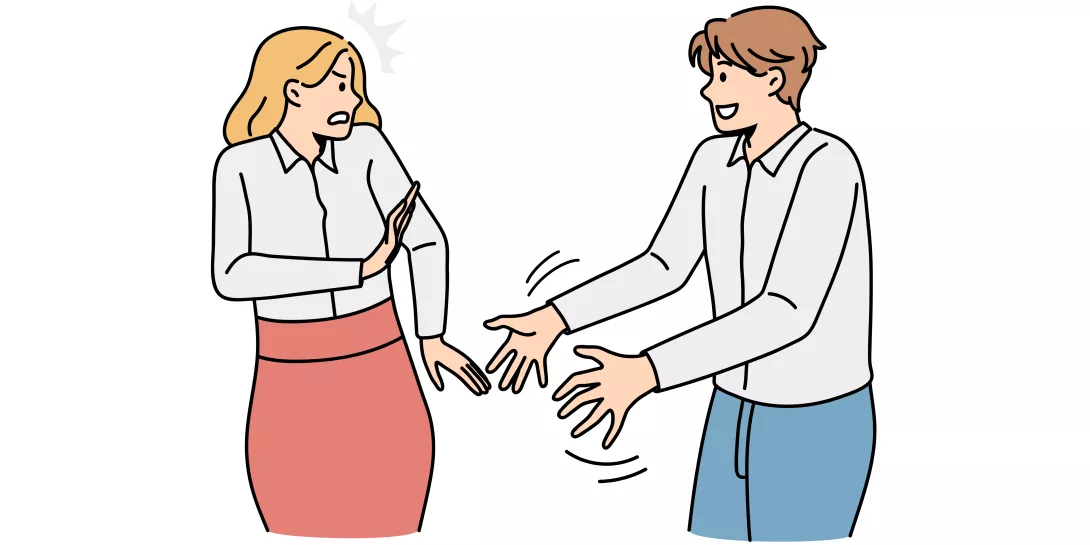Sexual Harassment
Last Reviewed:
Reviewed By:

You have the right to feel safe - always
Sexual harassment: What is it?
Sexual harassment includes any unwanted sexual behaviour, comments or attention.
It can be...
Physical
Like touching, grabbing or not letting you leave
Verbal
Like “catcalling”, making sexual jokes, comments about your body, or repeatedly asking you out after you've clearly indicated you are not interested
Visual
Like rude gestures, staring or sharing sexual images you did not ask for.
It can also look like someone stalking you online or offline. Like following you, watching you or making you or your family feel unsafe.
It is not your fault
It is the other person’s decision to behave that way. It’s not about what you wear or how you behave. Wearing a short skirt does not make someone behave badly. They are in control of their own actions!
Sexual Harassment is against the law
Human Rights Law
Human rights laws in BC prohibit sexual harassment in the workplace or in housing situations because it is a form of discrimination.


Get help
Get Help: The SHARP Workplaces legal clinic provides up to five hours of free confidential legal advice to help you deal with workplace sexual harassment. To contact SHARP Workplaces Legal Advice Clinic: Call: 604-673-3143 or Toll-free 1-888-685-6222
Safe work laws
WorkSafe BC require employers to provide a safe work environment free from bullying and harassment.

Criminal law
Unwanted physical touching may also be considered sexual assault. Stalking and making threats may be criminal harassment.


Get help
If you or someone you know is a victim of threats and harassment, help is available. You can call your local police or VictimLinkBC for more information and support. If you or someone else is in immediate danger call 911.
It can happen anywhere
In public spaces, harassment can be common, but that does not make it okay. Whether it is catcalling, whistling, or making rude comments, there are several things you can do if you are being harassed in public:
- Move to a safer location, where there may be more people or it is better lit.
- Call a friend, a parent, or someone you trust to stay on the phone with you.
- If you are comfortable, you may be able to verbally express your boundaries, such as saying “I want you to move away from me.” You should only do this if it is safe to do so, and there is no risk of the individual becoming violent.
- Tell a person of authority, such as a bus driver, bartender, bouncer etc. that an individual is making you uncomfortable.
- Contact transit police and/ or the police. In Metro Vancouver, you can contact the Transit Police directly by phone at 604-515-8300 or by text at 87-77-77 (Translink).
Places where people are drinking or using drugs can come with a higher risk of harassment or assault. Alcohol and drugs can affect how people act, including those who might harm others, and can also make it harder for someone to protect themselves. No matter what, if someone harasses or assaults you, it is never your fault – even if you were drinking or using drugs. Talk to a bouncer or bartender if you feel unsafe.
Sexual harassment can occur in the classroom, locker room, and more. Just because it is coming from a classmate or friend, does not mean it is not harassment. Sometimes jokes and flirting can cross the line.
You might consider telling a trusted adult, such as a parent, teacher, or school counsellor.
You have the right to live in your apartment free from sexual harassment. Your landlord or another tenant’s repeated and unwanted sexual advancements are sexual harassment. You can contact the Human Rights Clinic for advice.
In online gaming or in the comment section or with doxing, flaming, cyberstalking and posting revenge porn. Learn more at TechSafety Canada.
You have the right to a safe work environment free from bullying and harassment. Employers have the legal duty to maintain that safe work environment. That means they should take steps to protect workers who are being harassed by clients or customers as well as by other staff.
Emma

Emma got her first job as a hostess at a restaurant. While she was learning the job, the manager who hired her started spending more and more time at the host stand. They also started making more comments about her looks and inquiring about if she had a boyfriend. Sometimes they seemed to accidentally touch her, but it started happening more and more and she's starting to think it's not an accident. Emma was grateful for the job and felt like because she was" just a hostess" and they were a manager she shouldn't make any waves.
What Emma Can Do:
Trust her instincts
- If something feels wrong, it probably is.
- She does not have to wait until it “gets worse” to take action.
Document what’s happening
- Write down dates, times, what was said or done, and any witnesses.
- Keep these notes somewhere safe (phone, notebook at home).
- Remember, harassment can be subtle, keeping records of incidents can help show the pattern over time.
Set boundaries if safe
- If she feels safe, she could calmly say: “Please stop commenting on my looks. I’m here to work.”
- She doesn’t have to confront him directly if it feels unsafe.
Report the behaviour
- Workplaces should have a policy and process for reporting harassment.
- She can report to another manager, the restaurant owner, or HR (if there is one).
- If there’s a union, she can talk to a union rep.
- Keep a record of who your reported to and what actions they took.
Get outside help
- In BC, she can contact the Sharpe Workplaces or other legal clinics for advice.
- She can also talk to a trusted adult, friend, or legal help line like Ask JES.
- If the touching is sexual and without consent, it could also be a criminal offence — she can report to the police if she chooses.
Know her rights
- She has the right to a safe workplace.
- It’s illegal for her to be punished for reporting harassment, including by being fired, having her hours reduced or simply treated poorly at work.
 Crime & Police
Crime & Police Money Stuff
Money Stuff Health & Sexuality
Health & Sexuality Legal Life Skills
Legal Life Skills Driving
Driving Family
Family Work & School
Work & School Housing
Housing Basic Rights
Basic Rights